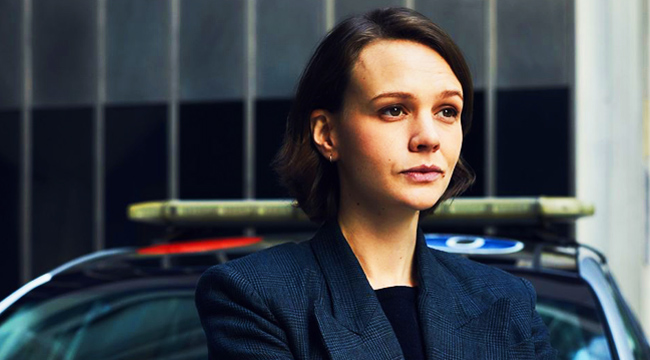
“We really are turning into a nasty little country,” suggests David Mars, midway through Netflix’s new UK-set limited series Collateral, which debuts Friday. David is a Member of Parliament who has devoted his life to both his nation and the Labour Party, but by the time he utters this sentiment during a TV interview, he’s feeling quite down on the state of both. So, for that matter, is pretty much everyone else in the show.
Created by acclaimed playwright (Plenty) and screenwriter (The Hours) David Hare, Collateral is a police procedural in the way that The Wire was a police procedural (or the various seasons of American Crime). There’s a murder that kicks off the story — the assassination of a pizza deliveryman, of all things — but it’s an excuse for Hare to explore a series of crises he sees afflicting his homeland, particularly in the wake of the Brexit vote and the anti-immigrant fervor sweeping parts of Europe and the United States. So even as cop Kip Glaspie (Carey Mulligan) investigates the initial murder, David (John Simm) battles for the soul of his own party, a group of undocumented immigrants get stuck indefinitely in a detention facility, Reverend Jane Oliver (Nicola Walker) deals with the fallout of having a girlfriend who entered Britain illegally, and soldier Sandrine Shaw (Jeany Spark) struggles with the lingering trauma of an overseas deployment for which she feels underappreciated. It’s all connected, as Lester Freamon might say, down to the murder happening outside the apartment of David’s ex-wife Karen (Billie Piper), and there’s a sense of enraged powerlessness to the whole affair: as a reporter David’s dating argues, “The system is the system. It caries on, regardless of what you feel about it.”
For a Netflix drama — albeit one co-produced by the BBC, where it premiered last month — Collateral is quite compact at only four episodes. It is, perhaps, too compact for the sweeping story Hare is attempting to tell about what happens when immigrants are treated with more hostility than violent criminals, the evils of human trafficking, and the damage that can be wrought through overprotective, reactionary thinking.
The show is so busy exploring its many areas of interest that it can’t spend the proper amount of time in all of them across only four hours. There’s supposed to be class conflict, for instance, between the highly educated — and modestly famous, thanks to an infamous pole vaulting flop at the Olympics in her younger years — Kip and her partner Nathan (Nathaniel Martello-White), but Nathan has to spell it all out late in the story to explain why he’s been acting so resentful of her. For that matter, Kip’s athletic past never really seems to inform how Hare writes her, nor how Mulligan plays her; it’s just a colorful biographical detail she can use to break the ice with witnesses. Jane’s relationship with Linh (Kae Alexander), and Linh’s role as a witness to the murder, feels hugely important early on, then fades away until close to the end. And the subplot about the spiral Karen goes into after the murder feels badly underfed; there’s backstory about her violent childhood in Beirut that’s frequently alluded to and then ignored (even David at one point tells her to stop talking about it already), and it never links up satisfactorily enough with everything else that’s happening, even though the story takes place over only four days, and much of it on the block where Karen and Jane live.
“It comes down to people,” Kip insists at one point, yet more often than not, the people of Collateral exist less as characters than as mouthpieces for various positions about contemporary Britain that Hare wants to argue for or against. That they’re played by such a superb cast of actors covers for a lot of this — Mulligan in particular is so dryly confident that she gives much more life to Kip than seems there on the page, and the quiet warmth and strength of Walker’s performance left me wanting to see a Reverend Jane spin-off unconnected to crime — but the political and narrative components of the series never merge as gracefully as some of its predecessors.
The major exception is Sandrine Shaw, who over the course of four hours is given a vivid backstory, recognizable motivation, and a clear, if emotionally difficult arc. Spark (Wallander) isn’t as well known on this side of the pond as some of her co-stars, but Hare invests a lot of time, faith, and emotional power of the project in her, and she delivers. In even a slightly longer version of the series, Hare might have been able to do that for Kip, Karen, and some of the others, rather than having to paint them in broad, quick strokes. (An MI5 agent wonders if Kip is perhaps “one more corner-cutting detective who breaks the rules?”)
It’s a great cast, and the show has its moments of both wry humor (my new ringtone will be Carey Mulligan asking, as Kip tries to chase down an errant lead, “Where the fuck is Boca Raton?”) and great pathos, and for once you won’t feel like a streaming drama is overstaying is welcome, but Collateral’s reach ultimately exceeds its grasp.
Alan Sepinwall may be reached at sepinwall@uproxx.com. He discusses television weekly on the TV Avalanche podcast. His new book, Breaking Bad 101, is on sale now.
